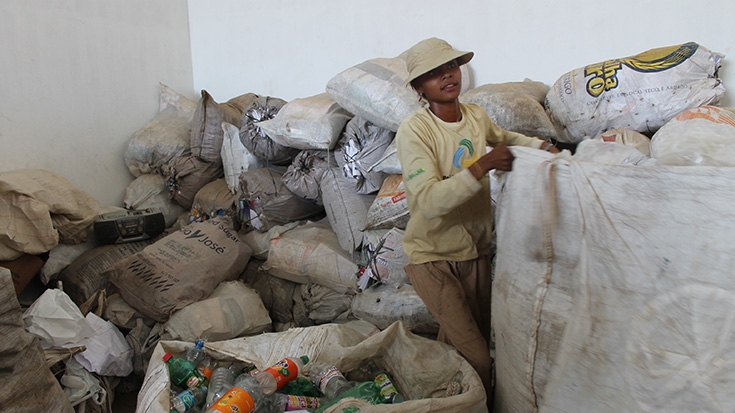For 23 years, the life of 47-year-old Ednalva Belo da Silva never changed: she got up early and worked until exhaustion at the dump in Parelhas, a city of 20,000 in northeast Brazil. From those mountains of garbage emerged food and clothing for her and her six children, two of them adopted.
At 19, Moana Nunes is much younger than Ednalva. But she also has years of experience working at a dump. Her father abandoned the family when she was six, so she began to help her mother. Until fifth grade, she worked half a day at the Caicó dump, 60 kilometers from Parelhas. After that, she began to work fulltime.
More than a year has passed since Ednalva and Moana left the dumps. They now work as “collectors of recyclable materials.” This is not only a politically correct term. The nature of their work changed completely when local municipalities prohibited working in dumps and created selective collection programs.
Both women work in cooperative associations in their communities. They wear uniforms and only work with dry waste free of food remains and other organic residue. They have fixed working hours. They spend part of the day on the street – collecting materials – and the other part in warehouses where they separate the materials, which are then sold to industries.
This new work environment does not have the characteristic stench of a dump, and the possibility of catching a disease is minimal. At the end of the month, each cooperative association divides the earnings among participants.
From knives to words
For those who worked in sub-human conditions for years, the new conditions offer numerous benefits – better health, more time to study, etc. – but also new challenges.
Collectors have become more visible than before. While they once worked on the outskirts of the city, they now have to go out on the streets in search of recyclable materials. At first, they were not well-received. “They told us to leave; often, they wouldn’t even give us a glass of water,” says Moana.
Another difference: life in the dumps was extremely individualistic. Collectors who could work more made more money. “And labor disputes were resolved at knifepoint,” recalls Joseilson Ferreira, a street educator at Caritas, an organization that supports the new collectors’ associations of Caicó and Parelhas.
“Today the conflicts are different: if someone breaks the rules or does not show up for work, he is punished. When separating materials, if one person separates more and another less, there is always someone who notices that the other person is not working. But the way to resolve problems has also changed, there is more dialogue now,” she says.

